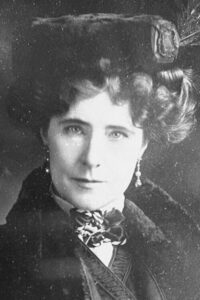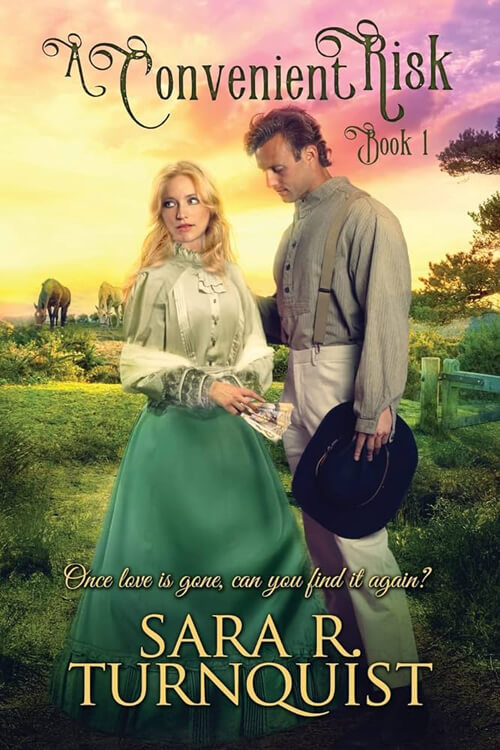
Beyond The Rocks, A Love Story
The hours were composed mostly of dull or rebellious moments during the period of Theodora’s engagement to Mr. Brown. From the very first she had thought it hard that she should have had to take this situation, instead of Sarah or Clementine, her elder step-sisters, so much nearer his age than herself. To do them justice, either of these ladies would have been glad to relieve her of the obligation to become Mrs. Brown, but Mr. Brown thought otherwise.
A young and beautiful wife was what he bargained for.
To enter a family composed of three girls—two of the first family, one almost thirty and a second very plain—a father with a habit of accumulating debts and obliged to live at Bruges and inexpensive foreign sea-side towns, required a strong motive; and this Josiah Brown found in the deliciously rounded, white velvet cheek of Theodora, the third daughter, to say nothing of her slender grace, the grace of a young fawn, and a pair of gentian-blue eyes that said things to people in the first glance.
Poor, foolish, handsome Dominic Fitzgerald, light-hearted, débonair Irish gentleman, gay and gallant on his miserable pension of a broken and retired Guardsman, had had just sufficient sense to insist upon magnificent settlements, certainly prompted thereto by Clementine, who inherited the hard-headedness of the early defunct Scotch mother, as well as her high cheek-bones. That affair had been a youthful mésalliance.
“You had better see we all gain something by it, papa,” she had said. “Make the old bore give Theodora a huge allowance, and have it all fixed and settled by law beforehand. She is such a fool about money—just like you—she will shower it upon us, and you make him pay you a sum down as well.”
Captain Fitzgerald, fortunately, consulted an honest solicitor, and so things were arranged to the satisfaction of all parties concerned except Theodora herself, who found the whole affair far from her taste.
Read or download Book
Elinor Glyn
Elinor Glyn (17 October 1864 – 23 September 1943) was a British novelist and scriptwriter who specialized in romantic fiction, which was considered scandalous for its time, although her works are relatively tame by modern standards. She popularized the concept of the it-girl and had tremendous influence on early 20th-century popular culture and, possibly, on the careers of notable Hollywood stars such as Rudolph Valentino, Gloria Swanson, and, especially, Clara Bow.
Early life and family background
Elinor Sutherland was born on 17 October 1864 in Saint Helier, Jersey, in the Channel Islands. She was the younger daughter of Douglas Sutherland (1838–1865), a civil engineer of Scottish descent, and his wife Elinor Saunders (1841–1937), of an Anglo-French family that had settled in Canada. Her father was said to be related to the Lord’s Duffus.
Her father died when she was two months old; her mother returned to the parental home in Guelph, in what was then Upper Canada, British North America (now Ontario) with her two daughters. Here, young Elinor was taught by her grandmother, Lucy Anne Saunders (née Willcocks), daughter of Sir Richard Willcocks, a magistrate in the early Irish police force, who helped to suppress the Emmet Rising in 1803.[5][6] Richard’s brother Joseph also settled in Upper Canada, publishing one of the first opposition papers there, pursuing liberty, and dying a rebel in 1814. The Anglo-Irish grandmother instructed young Elinor in the ways of upper-class society. This training not only gave her an entrée into aristocratic circles on her return to Europe, but it also led to her reputation as an authority on style and breeding when she worked in Hollywood in the 1920s. Her grandfather on her mother’s side, Thomas Saunders (1795–1873) was a direct descendant of the Saunders family who had possessed Pitchcott Manor in Buckinghamshire for several centuries.
The family lived in Guelph for seven years at a stone home that still stands near the University of Guelph. Glyn’s mother remarried in 1871 to David Kennedy, and the family returned to Jersey when Glyn was about eight years old. Her subsequent education at her stepfather’s house was by governesses. Glyn’s elder sister grew up to be Lucy, Lady Duff-Gordon, famous as a fashion designer under the name Lucile.
Life and career
Elinor married on 27 April 1892, at the age of 28. Her husband was Clayton Louis Glyn (13 July 1857 – 10 November 1915), a wealthy but spendthrift barrister and Essex landowner who was descended from Sir Richard Carr Glyn, an 18th-century Lord Mayor of London. The couple had two daughters, Margot and Juliet, but the marriage foundered on mutual incompatibility.
Glyn began writing in 1900, starting with Visits of Elizabeth, serialized in The World, a book based on letters to her mother, although Lady Angela Forbes claimed, in her memoirs, that Glyn used her as the prototype of Elizabeth. As Glyn’s husband fell into debt from around 1908, she wrote at least one novel a year to keep up her standard of living.
Her marriage was troubled, and Glyn began having affairs with various British aristocrats. Her novel Three Weeks, about a Balkan queen who seduces a young British aristocrat, was allegedly inspired by her affair with Lord Alistair Innes Ker, brother of the Duke of Roxburghe, sixteen years her junior, which scandalized Edwardian society.
Around 1907, Glyn toured the United States, resulting in her book Elizabeth visits America (1909).[1][11][12]






